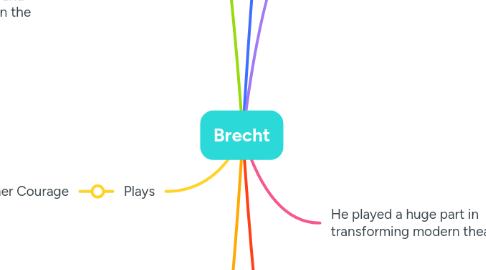
1. Techniques
1.1. Defamiliarization is a literary technique where objects or actions are described in a strange way to introduce a new perspective or way of thinking.
1.2. The Brechtian technique of acting in a manner that prevents the audience from passively identifying with the elements on the stage. Similar to the concept of defamiliarization, this involved showing ordinary thing in a different way to cause intrigue.
1.3. He also emphasized on things such as the actor’s direct address to the audience, harsh and bright stage lighting, the use of songs to interrupt the action, explanatory placards, etc, to make the audience realize more that it is a theatrical performance and not real also keeping the audience involved.
1.4. Placards are used as a sign of additional piece of information presented on stage. Placards tell us about the unseen thoughts and realities that we can't see when the actors are acting.
2. Plays
2.1. Mother Courage
2.1.1. He was trying to talk about his political thoughts/feelings on war and how you can't profit of of ware. Inspired by his personal experience of the invasion in Poland.
2.1.1.1. Due to the aftermath of WW1 and the consistent rise of fascism many politically conscious artists and playwrights like Brecht were forced to address the new political and social realities in their productions so that probably played a huge part in that too.
2.1.1.2. He felt that nothing comes out of war, whether you win or not both sides are affected and damaged so there's actually no point.
3. “First comes eating, then morality” - Bertolt Brecht
3.1. When you approach a script you can either take the information in a positive or negative way making use of different tones, volumes and gestures to communicate to the audience. It builds character and resilience.
3.2. The quote expresses Brecht's insight that there are some situations where one simply cannot afford to act morally.
3.2.1. This thought is probably inspired by his survival mindset during/after the war. In desperate situations he may have gone through (e.g. poverty), he would have had to grab an opportunity or chance he could get, or eat any food that he could get his hands so in that sort of situation it's more or so like find a solution first and afterwards reflect and decide whether what he did was morally right (e.g. stealing).
3.3. This thought encapsulates his worldview, which ended up becoming a recurring theme in many of his works.
3.3.1. Plays like Mother Courage and her children, The Caucasian chalk circle, The Threepenny Opera, etc..
4. He believed that the audience shouldn't identify with the characters but instead follow the method of epic's art, which is to make the audience realize that what they see is a mere account of past events and that they should watch it with critical detachment.
4.1. He was also influenced by Chinese theatre too, using its aesthetic as an argument for the “defamiliarization effect”(Verfremdungseffekt).
4.2. Influenced by Marxism - avoiding the premise that what the audience see is in the moment (here and now).
5. Epic Theatre - shows that a play should not connect with the spectator emotionally (actors or actions) but should instead provoke ration self-reflection and a critical point of view of the action on stage.
5.1. He developed the combined theory and practice of “Epic Theatre” by extending the experiments of Erwin Piscator and Vsevolod Meyerhold to explore theatre as a forum for political ideas and the creation of a critical aesthetics of dialectal materialism.
5.1.1. Dialectal materialism – a philosophy of sciences, history and nature developed in Europe based on writings of Karl Marx and Friedrich Engels.
5.2. Brecht thought that the experience of a climatic catharsis of emotion left an audience complacent however what he wanted was for his audiences to adopt a critical perspective to recognize a social injustice and exploitation.
5.2.1. To encourage and inspire people in a way to get the audience more active about social, environmental, and economic factors in the real world. Reminding them that theatre is a representation of reality not actual reality helps with that as it raises awareness to different issues.
6. He played a huge part in transforming modern theatre.
6.1. He did this by taking power away from the sole hands of the playwright and laid it in a way so that it would be circulated among the playwright, actor, and audience.
6.1.1. Leading to everyone involved in the performance to be thinking critically/effectively (getting everyone's thinking brains on).
6.2. He did this by introducing a collaborative effort where meaning is created through techniques like Verfremdungseffekt, Gestus, the ‘epic’ structure and the audience’s perception.
6.3. ghdg
7. Who is Brecht?
7.1. Brecht was first a German poet but then developed his skills and became a playwright and theatrical reformer.
7.1.1. Theatrical Reformer - A person who tries to change or improve theatre.
7.1.2. His epic theatre departed from the conventions of theatrical illusion and developed the drama as a social and ideological forum for leftist causes.
7.1.3. He made his theatre highly political due to being a marxist. He wanted his theatre to spark an interest in his audiences’ perception of the world and make them question the world they live in.
